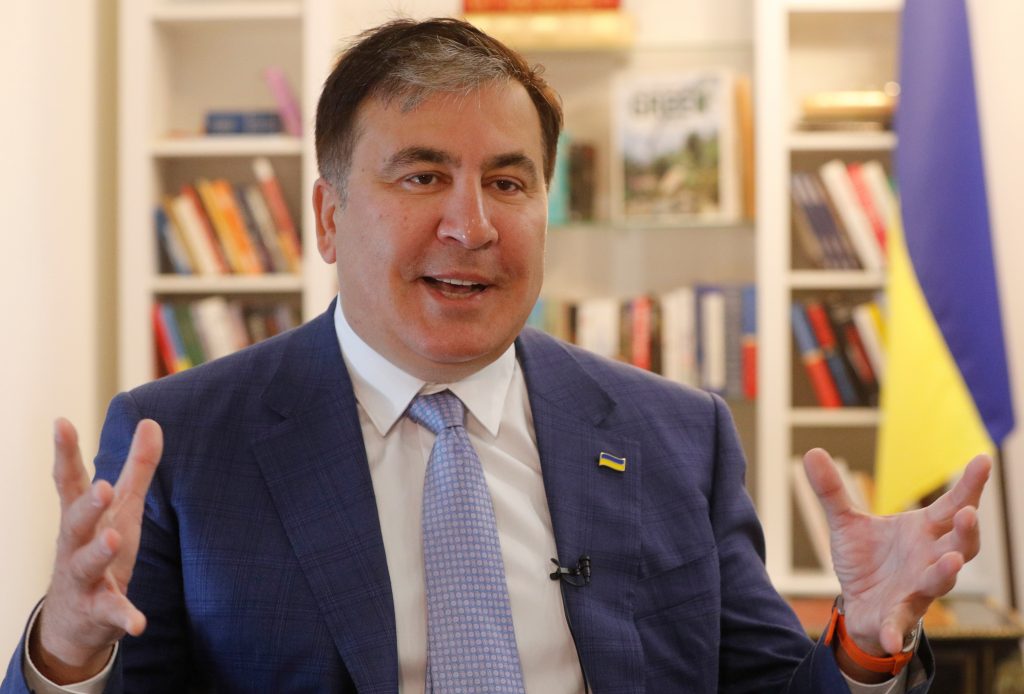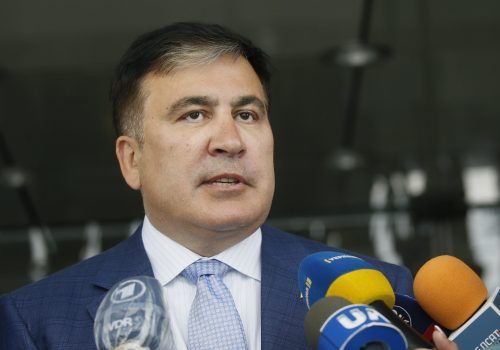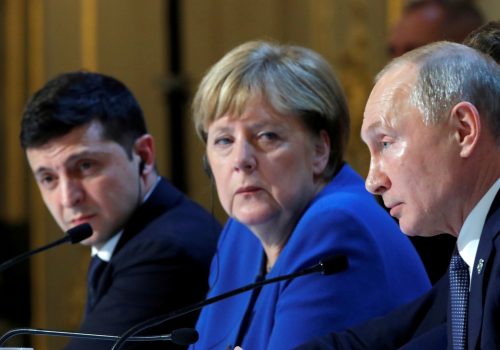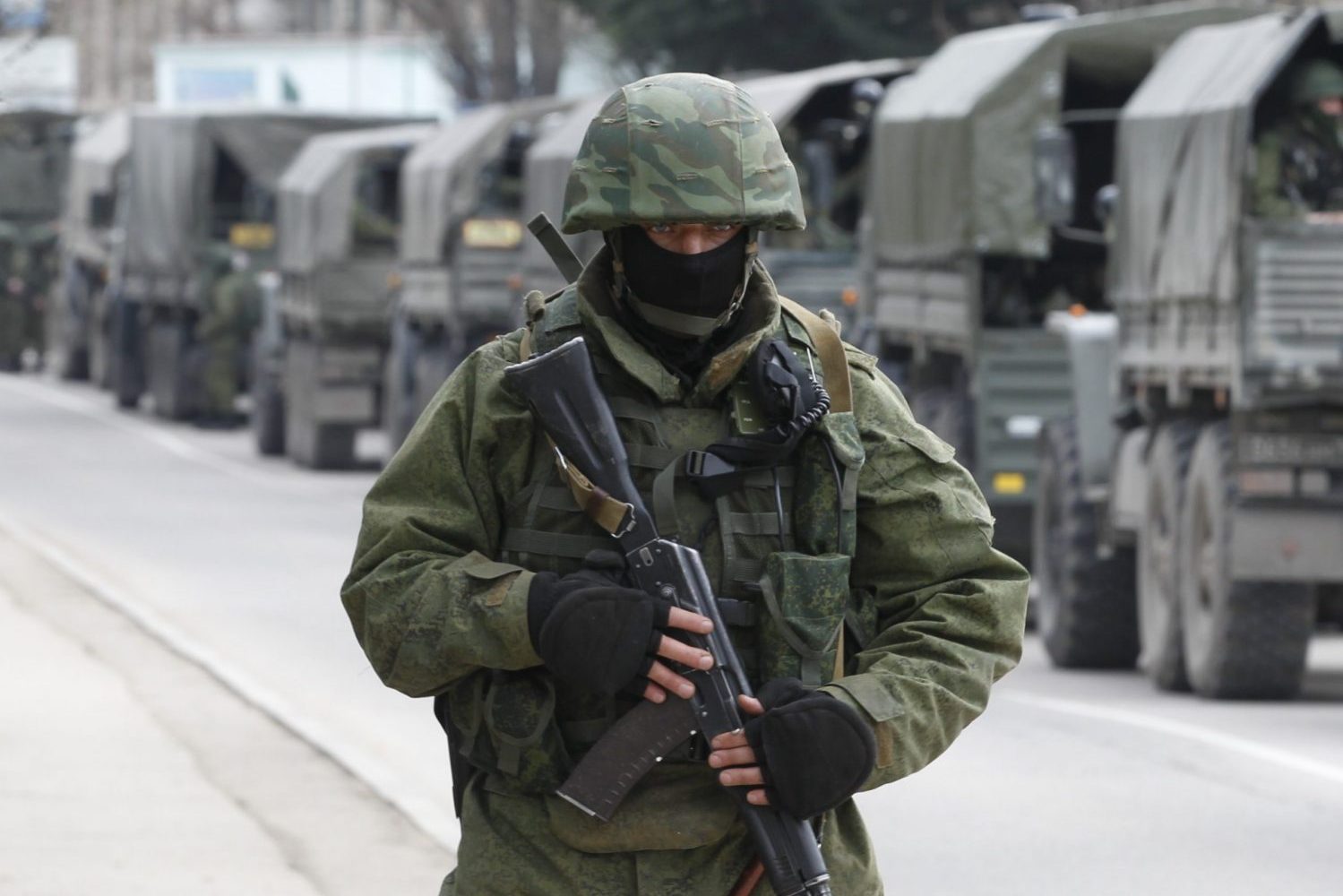Mikheil Saakashvili has promised to help President Zelenskyy “drain the swamp” as the former Georgian president embarks on the latest chapter of his unlikely second career in Ukrainian politics. On May 7, Zelenskyy appointed Saakashvili to head the executive committee of Ukraine’s National Reform Council. The appointment came after an April bid to install him as Ukraine’s Deputy Prime Minister for Reforms failed to garner the necessary support among MPs.
Saakashvili’s new role at the helm of a little-known government advisory body is a considerable step down for a man once touted as the most successful reformer in the former USSR. Nevertheless, it marks the end of an extended period in the political wilderness following his resignation as governor of Ukraine’s Odesa region in November 2016.
Saakashvili has longstanding ties to Ukraine, having studied in Kyiv as a university undergraduate in the twilight years of the Soviet Union and the dawn of Ukrainian independence. Following the end of his second term as president of Georgia, Saakashvili left his homeland in 2013 to avoid possible prosecution. His attempts to launch a new career in Ukrainian politics began soon afterwards. Saakashvili first lent his support to the country’s 2013-14 Revolution of Dignity and subsequent resistance to Russian military aggression in Crimea and eastern Ukraine, before accepting Ukrainian citizenship in May 2015 and becoming governor of Odesa region on the Ukrainian Black Sea coast.
Saakashvili’s bid to transform Odesa region soon ran aground amid strong resistance from local vested interests and a lack of political support from Kyiv, leading to his resignation and a period in increasingly direct confrontation with the Ukrainian government that culminated in the loss of his Ukrainian citizenship and his physical removal from the country. Undeterred by these setbacks, Saakashvili welcomed Volodymyr Zelenskyy’s 2019 presidential election victory as an opportunity to resume his Ukrainian political career, and duly had his Ukrainian citizenship reinstated within days of Zelenskyy’s inauguration.
The larger-than-life former Georgian president’s recent appointment to lead Ukraine’s National Reform Council has succeeded in generating headlines both domestically and internationally, but many remain unconvinced that this new role will allow Saakashvili to make his mark. His return to politics comes shortly after the dismissal of numerous prominent Ukrainian reformers, leading to suggestions that Saakashvili’s much-heralded arrival is primarily an attempt to distract attention from the Zelenskyy government’s unfolding anti-reform agenda.
What can Saakashvili realistically hope to achieve as head of Ukraine’s National Reform Council, and what does his appointment mean for the future of reforms in Ukraine?
Volodymyr Zelenskyy, President of Ukraine: I don’t expect to see the results of Mikheil Saakashvili’s appointment within a matter of days, but in the coming months we should see an impact. This will primarily mean deregulation in the business environment and reform of the customs service. We have discussed these issues at length. Saakashvili explained how he appointed entirely new people in the Georgian customs service, but was forced to dismiss them all and repeat the process several times. Customs reform is a very challenging issue, but I am committed to supporting Saakashvili’s efforts in this direction. Another key aspect of his appointment is Saakashvili’s positive experience of working with investment communities in many different countries. When Georgia developed Batumi as a major resort city during his presidency, they were able to attract various strategic investors including some of the biggest international hotel chains. This experience is important for Ukraine. (President Zelenskyy was speaking on May 9 during a visit to Zakarpattia region)
Oleksiy Goncharenko, Ukrainian MP, European Solidarity party: First of all, we need to understand that despite the word “executive” in the title, Saakashvili’s new position is advisory in nature. So the real question is not Saakashvili’s role, but the political will of President Zelenskyy himself to engage in genuine reform. I see no evidence from the first year of his presidency to suggest that this is the case. On the contrary, his most recent actions relating to healthcare reform demonstrate that Zelenskyy is currently more interested in his approval rating than in reforms. This raises the question of the real objective behind the appointment of a first-rate orator like Saakashvili to position that gives him a prominent platform but little actual political leverage. It is very possible that Saakashvili will become a spokesman of sorts for Zelenskyy’s reforms, which will remain a media phenomenon with little relation to real life.
Lisa Yasko, Ukrainian MP, Servant of the People party: The appointment of Mikheil Saakashvili is an opportunity to inject new pace into the implementation of reforms. I think Saakashvili can bring much-needed drive and direction to the Ukrainian reform process. He has the potential to make a positive contribution rather than serving as a destructive influence as some skeptics might argue. A lot will depend on attitudes among the cabinet of ministers and members of parliament. We need to work together with the necessary drive and without losing sight of the goals established by President Zelenskyy. I am convinced that Saakashvili is entirely sincere in his desire to help Ukraine achieve its national transformation. This is a good reason to be cautiously optimistic about his appointment.
Stay updated
As the world watches the Russian invasion of Ukraine unfold, UkraineAlert delivers the best Atlantic Council expert insight and analysis on Ukraine twice a week directly to your inbox.
Taras Kuzio, Professor, National University of Kyiv Mohyla Academy: Four factors explain why there will be no positive outcome on Ukraine’s reform agenda. Firstly, this appointment originates in Zelenskyy’s war with his predecessor Petro Poroshenko. Secondly, Zelenskyy has no reform strategy and therefore Saakashvili cannot know what approach his team should pursue on key issues such as dealing with Ukraine’s oligarchs. Thirdly, since moving to Ukraine, Saakashvili has become a populist allied with anti-reformers such as Tymoshenko. Fourthly, the Saakashvili-Zelenskyy bromance is not built on political affinity, because the latter is closer in spirit to the former’s enemy in Georgia, Bidzina Ivanishvili. I give it less than six months before an acrimonious split.
James Brooke, Chief Editor, Ukraine Business News: Saakashvili’s appointment is a breath of fresh air. The last 10 weeks has seen the purge from government of Ukraine’s best and brightest. Their replacements represent something worse than a dumbing down. Many learned how to do government business under President Yanukovych. Thinking that corrupt practices will not return is delusional. In the name of obedience to the administration of President Zelenskyy, a lot of serious, institution-building work is going to be thrown out of the window. Saakashvili radically reformed Georgia, transforming a failed state into a tourism mecca and a magnet for serious foreign investment. I was there before, during and after. In Ukraine, Saakashvili may not last beyond the summer, but his willingness to butt heads, his skill in playing the press, and his boldness to play the street may re-energize the reform movement. Without serious reform, foreign investment will not come and Ukraine will just keep moving sideways. In the first generation since independence, Ukraine lost 29% of its population and a major chunk of its territory while watching as neighboring Poland’s economy surged toward EU levels. Today, there is no longer any point in debating whether the country’s post-independence leaders should receive a ‘D’ or an ‘F’ grade. Looking ahead to Ukraine in the 2020s, business as usual is not an option.
Volodymyr Yermolenko, Chief Editor, UkraineWorld.org: Zelenskyy is trying to balance reformist and anti-reformist agendas. There is a clear revanchist trend emerging within his government marked by attempts to return Ukraine to a pre-Maidan style of politics complete with more corruption, less transparency, and closer ties to Russia. This is primarily visible in the law enforcement sector, which is increasingly being taken over by people intent on rolling back the reforms of the past six years. The dismissal of reformists including the Honcharuk government and Prosecutor General Ryaboshapka also reflects this anti-reformist trend. Against this background, the appointment of Saakashvili can be best understood as an attempt to balance the government’s growing anti-reformist tendencies. Saakashvili is a passionate promoter of liberal reforms and transparency, so his arrival in the Zelenskyy team might be read as a bid to show both Ukrainian society and the West that reforms are still on the agenda. However, serious questions remain regarding whether Saakashvili has enough power in his new advisory role to achieve progress. In this sense, his new appointment may mirror Saakashvili’s experience in 2015-2016 as governor of Odesa, when he also generated huge expectations but ultimately had very little power to do anything substantial. Meanwhile, the revanchist contingent within the Zelenskyy team enjoys genuine political power and is using it.
Eurasia Center events

Peter Zalmayev, Director, Eurasia Democracy initiative: President Zelenskyy’s electoral promise to fast-track anti-corruption reforms has been looking shop-worn of late. Ukraine’s oligarchs continue to call the shots in all areas of life, not least through their control of most of the country’s media. As a result, public support for Zelenskyy has waned quite precipitously, while experts are placing bets on how soon the president’s majority in parliament will splinter. By appointing the fast-talking, charismatic and populist Saakashvili as his chief anti-corruption warrior, Zelenskyy is no doubt sincere in his belief that the larger-than-life Georgian is capable of big, decisive moves and has the will to stir the hornets’ nest. But like his predecessor, the president will eventually learn to his chagrin that Saakashvili is capable of being loyal to nobody but himself, and that his ambition in Ukraine most certainly runs farther than either the governorship of an oblast or the leadership of a reform office. Unless or until that ambition is realized, Ukrainian leaders will keep on getting blindsided by the juggernaut of ambition that is Mikheil Saakashvili. Local pundits are already getting out their popcorn in anticipation of the political circus that is certain to begin very soon.
Bohdan Nahaylo, British-Ukrainian journalist: President Zelenskyy, struggling to inject direction and drive into his floundering administration, has unexpectedly pulled Mikheil Saakashvili out of his would-be magician’s hat. But the former Georgian president is hardly a meek rabbit; he is more of a wild cat, and he is about to be set loose among rats rather than pigeons. Saakashvili can be a useful temporary ally as a battering ram and could also serve as a potential scapegoat. The Georgian retains the image of a bruised and brusque self-styled champion of reform and implacable enemy of corruption. Uncomfortably for many, including populist politicians, his messages are usually spot on. In the absence of the means to ensure implementation, Saakashvili’s rhetoric will likely be dismissed as the mere release of hot air on behalf of an administration struggling to find itself and buy time. The key question is what lies behind this appointment. What does Zelenskyy really want to achieve at this stage? Is he looking to shake up the system, or merely to go through the motions? If he is gambling on Saakashvili to re-energize the reform process, he will have to empower him and back him. This will mean taking on allies who openly or secretly detest Saakashvili as a troublesome and overly ambitious “outsider”. Will the impulsive Zelenskyy himself be able to work in tandem with the Georgian firebrand, who thrives on projecting himself as a bulldozer? The potential for future problems is obvious. As presidents Eduard Shevardnaze and Petro Poroshenko both learned, hell hath no fury like this headstrong Georgian scorned.
Peter Dickinson is editor of the Atlantic Council’s UkraineAlert blog.
Further reading
The views expressed in UkraineAlert are solely those of the authors and do not necessarily reflect the views of the Atlantic Council, its staff, or its supporters.

The Eurasia Center’s mission is to enhance transatlantic cooperation in promoting stability, democratic values and prosperity in Eurasia, from Eastern Europe and Turkey in the West to the Caucasus, Russia and Central Asia in the East.
Follow us on social media
and support our work
Image: Mikheil Saakashvili pictured following his appointment as head of the executive committee of Ukraine's National Reform Council. May 8, 2020. REUTERS/Valentyn Ogirenko




